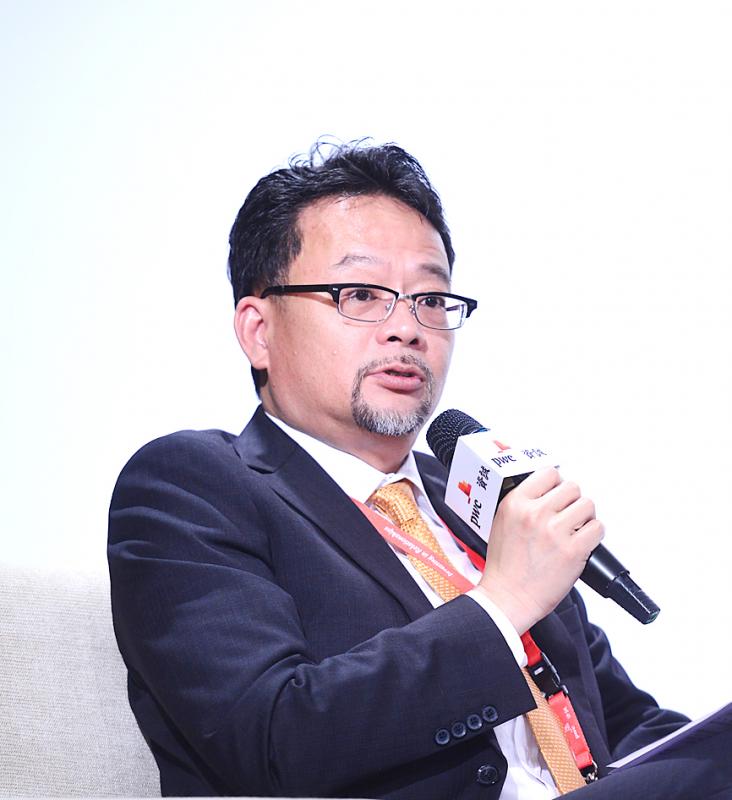Working from home is likely to become a regular arrangement even though the world is increasingly emerging from the COVID-19 pandemic, PricewaterhouseCoopers (PwC) Taiwan yesterday told a forum in Taipei.
PwC’s US arm has introduced a permanent remote working model for its 40,000 employees, who need to travel to the office three days per month or less, for key meetings or training courses, PwC Taiwan human resources head Alan Lin (林瓊瀛) said.
The accounting firm would adjust wages and perks for employees who move to locations with lower living costs, Lin said.

Photo courtesy of PwC Taiwan
PwC Taiwan would keep its offices unchanged for now, but it would seek to make better use of them in the future, he added.
Taiwanese workers mainly focus on monetary compensation, being able to be themselves at work, and being physically and psychologically cared for, Lin said, adding that 70 percent of them favor hybrid arrangements in which they can work from home on some days of the week.
Companies should seek to meet those expectations by providing fair monetary compensations and fulfilling work environments to recruit and retain talent, he said.
Globally, 54 percent of workers think their job can be done remotely, and 41 percent of Taiwanese workers share this view, PwC Taiwan said, citing a survey.
Lin said higher wages can help retain talent, but overreliance on pay increases might contribute to inflation, as companies would have to pass higher personnel costs to customers.
Companies should instead pay attention to workers’ needs, as global data showed that they are willing to spend 20 to 25 percent of their income on improving their work-life balance, he said.

SEEKING CLARITY: Washington should not adopt measures that create uncertainties for ‘existing semiconductor investments,’ TSMC said referring to its US$165 billion in the US Taiwan Semiconductor Manufacturing Co (TSMC, 台積電) told the US that any future tariffs on Taiwanese semiconductors could reduce demand for chips and derail its pledge to increase its investment in Arizona. “New import restrictions could jeopardize current US leadership in the competitive technology industry and create uncertainties for many committed semiconductor capital projects in the US, including TSMC Arizona’s significant investment plan in Phoenix,” the chipmaker wrote in a letter to the US Department of Commerce. TSMC issued the warning in response to a solicitation for comments by the department on a possible tariff on semiconductor imports by US President Donald Trump’s

The government has launched a three-pronged strategy to attract local and international talent, aiming to position Taiwan as a new global hub following Nvidia Corp’s announcement that it has chosen Taipei as the site of its Taiwan headquarters. Nvidia cofounder and CEO Jensen Huang (黃仁勳) on Monday last week announced during his keynote speech at the Computex trade show in Taipei that the Nvidia Constellation, the company’s planned Taiwan headquarters, would be located in the Beitou-Shilin Technology Park (北投士林科技園區) in Taipei. Huang’s decision to establish a base in Taiwan is “primarily due to Taiwan’s talent pool and its strength in the semiconductor

An earnings report from semiconductor giant and artificial intelligence (AI) bellwether Nvidia Corp takes center stage for Wall Street this week, as stocks hit a speed bump of worries over US federal deficits driving up Treasury yields. US equities pulled back last week after a torrid rally, as investors turned their attention to tax and spending legislation poised to swell the US government’s US$36 trillion in debt. Long-dated US Treasury yields rose amid the fiscal worries, with the 30-year yield topping 5 percent and hitting its highest level since late 2023. Stocks were dealt another blow on Friday when US President Donald

UNCERTAINTY: Investors remain worried that trade negotiations with Washington could go poorly, given Trump’s inconsistency on tariffs in his second term, experts said The consumer confidence index this month fell for a ninth consecutive month to its lowest level in 13 months, as global trade uncertainties and tariff risks cloud Taiwan’s economic outlook, a survey released yesterday by National Central University found. The biggest decline came from the timing for stock investments, which plunged 11.82 points to 26.82, underscoring bleak investor confidence, it said. “Although the TAIEX reclaimed the 21,000-point mark after the US and China agreed to bury the hatchet for 90 days, investors remain worried that the situation would turn sour later,” said Dachrahn Wu (吳大任), director of the university’s Research Center for